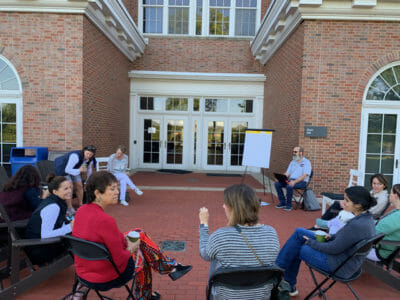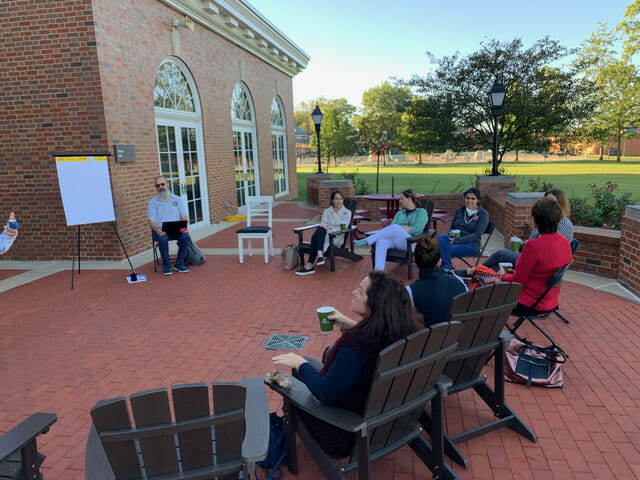Upper School parents were invited to spend time with David Hotaling, US Counselor, on the back patio of Olson Hall last week. The goal of these sessions is for parents to receive new information and resources from the counselor (or guest speaker), to be affirmed by the group, and to make connections with other parents.
After welcome, announcements, and introductions, Hotaling led a group activity asking parents to brainstorm a success, a challenge, and a hope that they have for their Upper School students. This lead to an open discussion about all kinds of things related to parenting teens. One attendee described the discussion as „open, collaborative, and generative.”
“The greatest value was probably just the chance to be together outside on a crisp, Friday morning, in a communal, supportive atmosphere,” said Hotaling. “With all of the parent events happening virtually last year, parents have been waiting a long time for such an opportunity to happen in person.”
The group discussed the benefits of positive psychology, which can be helpful to both parents and students as we embrace the challenges of the school year. For example, keeping a gratitude journal can help with stress management and mental health. In an experimental comparison, those who kept gratitude journals on a weekly basis exercised more regularly, reported fewer physical symptoms, felt better about their lives as a whole, and were more optimistic about the upcoming week compared to those who recorded hassles or neutral life events (Emmons & McCullough, 2003).
Parents also discussed the Happiness Formula which encourages reflection on “what we have” versus “what we want.” Hotaling encourages families to spend time with people and spend time on people (such as volunteering or performing caring acts for friends and family). Maintain a healthy mind in a healthy body, especially with sleep and exercise. Hotaling shared a quote from Dr. John Ratey: “In a way, exercise can be thought of as a psychiatrist’s dream treatment. It works on anxiety, on panic disorder, and on stress in general, which has a lot to do with depression. And it generates the release of neurotransmitters—norepinephrine, serotonin, and dopamine—that are very similar to our most important psychiatric medicines. Having a bout of exercise is like taking a little bit of Prozac and a little bit of Ritalin, right where it is supposed to go.” Finally, focusing on character strengths—noticing and naming strengths in others—gives a dopamine boost and encourages their usage in ourselves and others (viacharacter.org).
Hotaling offered these additional resources for parents:
Thank you, Mr. Hotaling, for taking the time to meet with our parents and to continue offering wonderful resources for our community!
